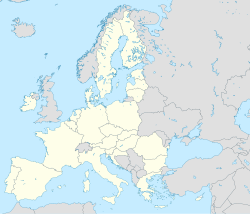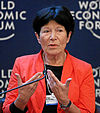|
European Research Council
The European Research Council (ERC) is a public body for funding of scientific and technological research conducted within the European Union (EU). Established by the European Commission in 2007, the ERC is composed of an independent Scientific Council, its governing body consisting of distinguished researchers, and an Executive Agency, in charge of the implementation. It forms part of the framework programme of the union dedicated to research and innovation, Horizon 2020, preceded by the Seventh Research Framework Programme (FP7). The ERC budget is over €13 billion from 2014 – 2020 and comes from the Horizon 2020 programme, a part of the European Union's budget. Under Horizon 2020 it is estimated that around 7,000 ERC grantees will be funded and 42,000 team members supported, including 11,000 doctoral students and almost 16,000 post-doctoral researchers. Researchers from any field can compete for the grants that support pioneering projects. The ERC competitions are open to top researchers also from outside the union. The average success rate is about 12%.[1] Five ERC grantees have won Nobel Prizes.[2][3][4] Grant applications are assessed by qualified experts. Excellence is the sole criterion for selection; there are neither thematic priorities, nor geographical quotas for funding. The aim is to recognise the best ideas, and confer status and visibility to the best research in Europe, while also attracting talent from abroad. Along with national funding bodies, the ERC aims to improve the climate for European frontier research. The Scientific Council has been keen to learn from the ERC's peers in national research councils (European and overseas) and to engage in dialogue and appropriate collaboration. BackgroundThe idea of having a pan-European funding mechanism for basic research has been discussed and supported for a long time. However, its realisation was held back at the political level because the founding treaties of the European Union was interpreted as allowing union funding only to strengthen the scientific and technological base of European industry – that is, only funding for applied research rather than basic research. In conjunction with the Lisbon declaration in 2000, leaders of the EU, in particular the European Commissioner for Research at the time, Philippe Busquin, realised that the European Treaty had to be reinterpreted; a transformation of European economy from traditional manufacturing to a knowledge-based economy has to involve the enhanced support at the European level for science of all kinds, including both fundamental and applied research. In 2003, a report from the ERC Expert Group (ERCEG), chaired by Professor Federico Mayor, described how the ERC could take shape. In 2004, a high-level expert group was commissioned to further explore the possibilities of creating a European Research Council. This group concluded that the EU should establish an institution to support frontier research. A number of other expert groups, such as one commissioned by the European Science Foundation, another charged with the task of analysing the economic implications of the Lisbon declaration and a high level group commissioned by the European Commission, also arrived at a similar conclusion and boosted the idea. With the ice broken, scientists and politicians have since strongly supported the establishment of an ERC. In 2006, the European Parliament and EU Council of Ministers accepted the Seventh Framework Programme (FP7) for the European Union's support for research, of which the ERC was a flagship component. In the ERC kick-off conference in Berlin, various speakers talked of 'an idea whose time has come', 'a European factory of ideas', 'a champions' league', 'a great day for Europe and a great day for science', and the beginning of a 'snowball effect'.[5][6] OrganisationScientific CouncilThe ERC is governed by the Scientific Council (ScC), consisting of 22 eminent European scientists and scholars (including Nobel prize laureates), and supported operationally by the European Research Council Executive Agency (ERCEA), based in Brussels. The ScC acts on behalf of the scientific community in Europe to promote creativity and innovative research. It is responsible for setting the ERC's scientific strategy, including establishing the annual Work Programmes, designing the peer review systems, identifying the peer review experts, and communicating with the scientific community. The first Scientific Council members were nominated by Commissioner Potočnik in July 2005 and worked intensively to define the key principles and scientific operating practices of the ERC in preparation for the start-up. The members of the Scientific Council are selected by an Identification Committee, consisting of highly respected personalities in European research, and appointed by the European Commission. The ScC members term of office lasts four years. PresidentFollowing its formal establishment, the Scientific Council reaffirmed the election of its chair and ERC president, Professor Fotis Kafatos, and the two vice-chairs and ERC vice-presidents, Professor Helga Nowotny and Daniel Estève. After the highly successful presidency of Fotis Kafatos, Helga Nowotny took over as president in March 2010 with Carl-Henrik Heldin and Pavel Exner as vice-presidents. In January 2014, after the end of Helga Nowotny's term of office, Professor Jean-Pierre Bourguignon became ERC president. Since then, the ERC also has a third vice-president, Professor Nuria Sebastian Galles, alongside the two vice-presidents already in office (each of them in charge of one of the ERC scientific domains). In May 2019, internationally recognized nanomedicine scientist Mauro Ferrari was named the next president of the European Research Council. 30 June 2021, Professor Maria Leptin was named president of the ERC from 1 October 2021.
Standing committeesThe ERC Scientific Council has established two Standing Committees: one deals with conflict of interest issues, the other oversees the selection of reviewers and panel lists. Executive AgencyThe Scientific Council is supported operationally by the European Research Council Executive Agency (ERCEA), based in Brussels. The implementing pillar of the ERC, the ERC Executive Agency (ERCEA), is responsible for supporting the peer review process, implementing the ERC strategy as set by the ScC, executing all financial operations and communicating about the ERC. The ERCEA is currently headed by the Director, Laurence MOREAU. It employs some 500 staff of which more than 50 hold PhDs. The fact that most Scientific staff hold a PhD, have done post-docs and/or have been academics reinforces the feeling among panellists and the Scientific Community as a whole that ERC Schemes are implemented by scientists understanding the pitfalls and hurdles of Research and who are constantly working to better their procedures in order to simplify the application as well as the granting processes, hand in hand with their colleagues from financial units. Steering CommitteeThere is also a five-member ERCEA Steering Committee, chaired by the European Commission's Director-General for Research and Innovation, two ScC members, and two Commission officials. Measures to ensure an integrated institutionTo create an integrated institution consisting of the ScC and the ERCEA, two integrative mechanisms were initially put in place:[7]
Budget and peer reviewUnder the EU's Framework Programme for Research and Innovation Horizon 2020 the ERC has a budget of €13.1 billion for the period 2014 – 2020. That is a substantial increase from its initial seven-year budget under the EU's seventh Research Framework Programme (2007–2013), when the total allocated to the ERC was €7.5 billion. The ERC budget is supported by the European Commission and is supplemented by contributions from the EU associated countries. Together, the 27 EU member states and the associated countries comprise the European Research Area (ERA). The ERC's peer-review evaluation process must command the confidence of the research community and is central to the achievement of the ERC's objectives. The ERC Scientific Council divided the full range of scientific disciplines into three major domains, with budgets allotted as follows. The peer review in the three domains is carried out by a total of 25 panels led by Panel Chairs whose scientific status gives credibility to the selection process. The peer review experts come from all over the world, which makes the ERC peer review process one of the most international of its kind on this scale. There are currently about 900 ERC panel members; together with the 2000 external reviewers, they constitute the backbone of the ERC evaluation structure.
The ScC encourages interdisciplinary proposals. Grants offeredPrinciplesThe two founding principles of the ERC regarding grants are:
The ERC asks researchers to think big, and provides generous support for ambitious projects. It does not want its carefully selected grantees to waste their time by taking on numerous peripheral projects, or constantly having to seek additional money to fund their research. The grants are flexible, so that all costs for a specific project can be covered, and portable, meaning that if grant holders move to another university or institute, the grant moves with them. The applicant can be of any nationality and age, and needs to demonstrate an excellent track record and present a ground-breaking research proposal. The research must be conducted in a Host Institution located within the European Union or an associated country.[11] SchemesThe council offers the following grant schemes, with funding for up to five years:[12][13][14]
Annual applicationsThe following charts present annual success rates.[15] Starting Grants1,000
2,000
3,000
4,000
5,000
6,000
7,000
8,000
9,000
10,000
2007
2008
2009
2010
2011
2012
2013
2014
Consolidator Grants1,000
2,000
3,000
4,000
2013
2014
Advanced Grants500
1,000
1,500
2,000
2,500
3,000
2008
2009
2010
2011
2012
2013
Availability of publications and resultsThe Scientific Council has adopted an 'open access' policy with regard to the access and availability of publications and research results. This requires all peer-reviewed publications from ERC-funded research projects to be deposited in the appropriate Internet-accessible libraries within six months of publication.[citation needed] See also
Notes
References
External links |
|||||||||||||||||||||||||||||||||||||||||||||||||||||||||||||||||||||||||||||||||||||||||||||||||||||||||||||||||||||||||||||||||||||||||||||||||||||||||||||||





